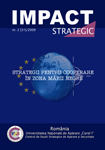COOPERARE VS. CONFLICT ÎN DOMENIUL ENERGIEI NATURALE ÎN REGIUNEA EXTINSĂ A MĂRII NEGRE
COOPERATION VS CONFLICT IN THE REALM OF NATURAL ENERGY WITHIN THE GREATER BLACK SEA AREA
Author(s): Șerban Filip CioculescuSubject(s): Politics / Political Sciences
Published by: Carol I National Defence University Publishing House
Keywords: natural energy resources; corridors; security; European Union; Russia; cooperation; rivalry; international relations theory.
Summary/Abstract: Access to natural energy is an imperative for all the states in the world, as economic development and welfare of people is often directly dependent on the wealth of resources controlled. Contemporary world as a whole is dependent on the existence of energy resources, of which oil and gas are of utmost importance.The countries within the Greater Black Sea Area are facing a real “strategic” dilemma regarding the means to gain access to energy resources and the transportation corridors. They may choose to cooperate with each other to jointly exploit the necessary resources to increase the total benefits or, on the contrary, they could prefer individual strategies, often competitive ones. The choice is up to the political and economic decision-makers, but those are influenced by factors such as the domestic political system, the sub-state actors benefiting from these policies (bureaucrats, lobbies, and interest groups), the international economic environment and the external actors. By applying some International Relations theories - neorealism, institutional neoliberalism and social constructivism - one can better understand the basic logic of the behaviors adopted by decision-makers on behalf of their states in the so sensitive field of energy resources management. In the end we showed that the “ neorealist ” logic still dominates Russia’s relations with its direct neighborhood and those with the EU, but we think a greater coherence in EU foreign policy towards Moscow could lead to a translation to neoliberal logic as Russia would gradually learn the lesson of beneficial cooperation.
Journal: Impact strategic
- Issue Year: 31/2009
- Issue No: 2
- Page Range: 8-14
- Page Count: 7
- Language: English, Romanian

